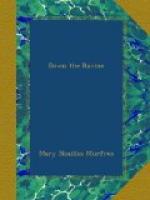“Tim an’ yer dad always pulls the fodder an’ sech—I knows ez that air a true word,” said Birt, bluntly. “An’ I can’t git away from the tanyard at all ef ye won’t holp me, ’kase old Jube ’lowed he wouldn’t let me swop with a smaller boy ter work hyar; an’ all them my size, an’ bigger, air made ter work with thar dads, ‘ceptin’ you-uns.”
Nate heard, but he hardly looked as if he did, so busily absorbed was he in fitting this fragment of fact into his mental mosaic. It had begun to assume the proportions of a distinct design.
He suddenly asked a question of apparent irrelevancy.
“This hyar land down the ravine don’t b’long ter yer folkses—who do it b’long ter?”
“Don’t b’long ter nobody, ye weasel!” Birt retorted, in rising wrath. “D’ye s’pose I’d be a-stealin’ of gold off’n somebody else’s land?”
Nate’s sly, thin face lighted up wonderfully. He seemed in a fever of haste to terminate the conference and get away. He agreed to his friend’s proposition and promised to be at the bark-mill bright and early in the morning. As he trudged off, Birt Dicey stood watching the receding figure. His eyes were perplexed, his mind full of anxious foreboding. He hardly knew what he feared. He had only a vague sense of mischief in the air, as slight but as unmistakable as the harbinger of storm on a sunshiny summer day.
“I wisht I hedn’t tole him nuthin’,” he said, as he wended his way home that night. “Ef my mother hed knowed bout’n it all, I wouldn’t hev been ‘lowed ter tell him. She DEspises the very sight o’ this hyar Nate Griggs—an’ yit she say she dunno why.”
After supper he sat gloomy and taciturn in the uninclosed passage between the two rooms, watching alternately the fire-flies, as they instarred the dark woods with ever-shifting gold sparks, and the broad, pale flashes of heat lightning which from time to time illumined the horizon. There was no motion in the heavy black foliage, but it was filled with the shrill droning of the summer insects, and high in the branches a screech-owl pierced the air with its keen, quavering scream.
“Tennessee!” exclaimed Birt, as the unwelcome sound fell upon his ear—“Tennessee! run an’ put the shovel in the fire!”
Whether the shovel, becoming hot among the live coals, burned the owl that was high in the tree-top outside, according to the countryside superstition, or whether by a singular coincidence, he discovered that he had business elsewhere, he was soon gone, and the night was left to the chorusing katydids and tree-toads and to the weird, fitful illuminations of the noiseless heat lightning.
Birt Dicey rose suddenly and walked away silently into the dense, dark woods.
“Stop, Tennessee! ye can’t go too!” exclaimed Mrs. Dicey, appearing in the doorway just in time to intercept the juvenile excursionist. “Ketch her, Rufus! Ef she wouldn’t hev followed Birt right off in the pitch dark! She ain’t afeared o’ nothin’ when Birt is thar. Git that pomegranate she hed an’ gin it ter her ter keep her from hollerin’, Rufe; I hed a sight ruther hear the squeech-owEL.”




